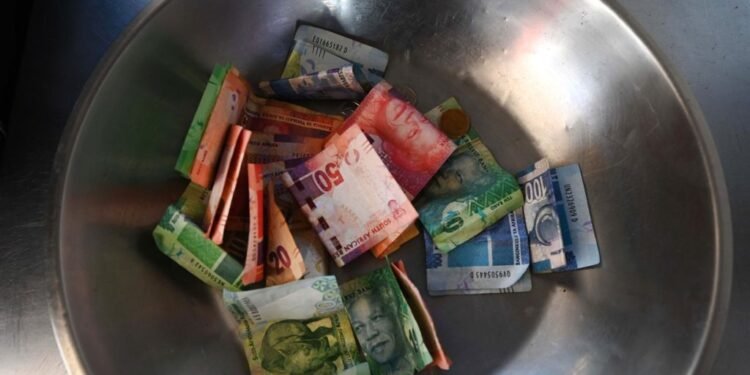The rand steadied as South Africa’s currency tracks developments affecting its biggest export partner China, which is ramping up support for the yuan.
The rand fluctuated between gains and losses and was little changed at R19.07 per dollar as of 10:30 a.m. in Johannesburg. China’s onshore yuan was also largely steady at 7.2896.
The People’s Bank of China delivered its strongest-ever push-back against a weaker yuan via its daily reference rate. That, and other steps to shore up China’s currency, has also provided some respite for the rand, which is still headed for its worst August since 2018 after notching up a 6.4% decline against the dollar so far this month.
The South African currency has taken a pummeling recently as concerns swirl about mounting financial fragility in China, the biggest market for the country’s shipments of commodities and other exports. The rand’s decline this month is the biggest behind Argentina’s peso among developing-nation currencies.

“Not only is China South Africa’s largest export partner, but developments in the Chinese economy, particularly in the real estate market, affect the prices of key South African exports such as iron ore,” said Masayuki Nakajima, the London-based senior EMEA FX strategist at Mizuho Bank. “Meanwhile, the US economy remains resilient, particularly in terms of consumption, and rising US interest rates and a stronger dollar are headwinds for the currencies of resource-rich and emerging economies, including the South African rand.”
In other news, Minister of Electricity Kgosientsho Ramokgopa voiced confidence in an interview with Bloomberg on Thursday that energy shortages were being tackled and predicted an additional 4 700 megawatts of power would be added to the grid in the next few months.
He said he expected to a seal a deal with the Chinese government next week at the Brics summit that will help solar-power installers in South Africa secure access to panels for projects needed to tackle its energy crisis.
South Africa’s rolling blackouts have also been blamed by strategists as the single biggest factor weighing on the rand.

Kgosientsho Ramokgopa Image: Leon Sadiki/Bloomberg
Prospects for gains in the rand in the next year or so are “really firm,” and much of this optimism is down to the outlook for electricity supply, according to Mamokete Lijane, global markets strategist at Standard Bank Corporate and Investment Banking.
© 2023 Bloomberg









